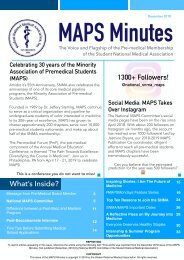JSNMA SUMMER 2019 Sneak Preview
Create successful ePaper yourself
Turn your PDF publications into a flip-book with our unique Google optimized e-Paper software.
Opinion<br />
11<br />
AN UNSPOKEN<br />
EXPECTATION<br />
JULI LAMBERT, MS III<br />
UNIVERSITY OF TOLEDO COLLEGE OF MEDICINE AND LIFE SCIENCES<br />
Our SNMA chapter held an<br />
event where a physician<br />
and professor at Northeast<br />
Ohio Medical University served<br />
as the guest speaker. He shared<br />
his rational and open-minded<br />
perspectives on medical education,<br />
humanism, and social justice. At the<br />
end of his enlightening talk, a White<br />
medical student seated in the back<br />
of the room proceeded to reveal<br />
his bigoted mindset by claiming<br />
that racism is “not a thing” and<br />
that White men should not be held<br />
responsible for the social disparities<br />
in healthcare. It was clear that<br />
this student’s motives were to<br />
antagonize the guest speaker, but,<br />
as ludicrous as his argument was,<br />
it made me wonder how many of<br />
my other colleagues held the same<br />
misinformed views.<br />
As medical students, we are<br />
informed early on what is expected<br />
of us. Professionalism, punctuality,<br />
knowledge, and perseverance.<br />
However, what we are not told,<br />
but figure out soon enough, is the<br />
unspoken expectation that we as<br />
minority students must face in<br />
medical school. As one of only<br />
three African Americans in a class<br />
of 175, we had suddenly become<br />
the “token Black people”. Once a<br />
minority student is assigned this<br />
type of role, they automatically<br />
become the representative for<br />
all who look like them. It does<br />
not matter that their individual<br />
experiences and ideas in no way<br />
represent the entirety of their culture<br />
or race. Often times that designated<br />
student is actually the first person<br />
of a particular race or ethnicity that<br />
some of their colleagues have ever<br />
interacted with. And with this comes<br />
the burden of being the target for all<br />
the random, asinine questions that<br />
have ever crossed their minds but<br />
they have never had the courage<br />
or opportunity to ask.<br />
It is a challenging role that we<br />
as minorities are forced to fulfill.<br />
Should I get exasperated when I<br />
am asked about my hair, or should I<br />
kindly educate them on the<br />
intricacies of protective hairstyles?<br />
Should I get irritated every time I<br />
am asked what my ethnicity is, or<br />
should I politely say: “Yes, I, too, am<br />
American?” Should I get annoyed<br />
when I hear about reverse racism,<br />
or should I patiently explain the<br />
mass effect of institutionalized<br />
discrimination? I find my day-to-day<br />
reaction to be a delicate balance<br />
between “angry Black woman” and<br />
“patient Buddha”. It is a different<br />
kind of frustration that comes with<br />
having to explain everything that<br />
makes you who you are. Having<br />
your culture and individuality<br />
slowly picked at and scrutinized<br />
time and time again, until it finally<br />
makes sense to someone else, is<br />
absolutely draining.<br />
I wish my classmates could<br />
recognize the privilege that they<br />
have experienced for most, or<br />
perhaps all, of their lives by residing<br />
in areas where most, if not all, of<br />
their classmates looked like them,<br />
thought like them, and acted like<br />
them. The privilege that comes with<br />
being born into the majority gives<br />
little incentive for understanding<br />
those who are not. Both the<br />
antagonizing medical student and<br />
I find my day-to-day reaction to be<br />
a delicate balance between ‘angry<br />
Black woman’ and ‘patient Buddha.’<br />
myself will become doctors<br />
in the near future, and it will be our<br />
job to deliver appropriate care even<br />
to those who are dissimilar to us. So<br />
what kind of care would be provided<br />
to a patient if their socio-economic<br />
struggles that play a major role in<br />
their health are ignored or brushed<br />
off by their doctor as being “not a<br />
thing”?<br />
At times, I find myself upset<br />
with how my colleagues’ lack of<br />
understanding supposedly warrants<br />
the additional burden that I am<br />
Continued on page 75<br />
A U G U S T 2 0 1 9






